Brussels – The European Union looks “with great concern” at the latest developments in Kosovo, with “two examples of uncoordinated, unilateral actions taken without the necessary level of prior consultation.” It is the spokesman for the European External Action Service (EEAS), Peter Stano, who explains to the European press today (Feb. 5) the climate in Brussels over recent decisions by authorities in Pristina regarding the Serb-Kosovar minority. After the Regulation that introduced the exclusive use of the euro as the national currency, it is the special police operations at the offices of the temporary institutions run by Serbia in four municipalities in northern Kosovo that put EU institutions and international partners on alert.
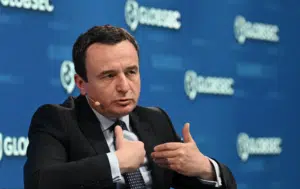
“These actions do not contribute to de-escalation, to calming the situation, and to assuring people that their lives will improve,” Stano warned, elaborating on the reasons for the “great concern” expressed in yesterday’s (Feb. 4) note of the EEAS about the police operations in the municipalities of Dragash, Pejë, Istog, and Klinë and at the NGO Center For Peace and Tolerance office in Pristina. “The sudden closure of these offices will adversely affect the daily lives and living conditions of the Serbo-Kosovar communities,” reads the communiqué coordinated with the Union’s international partners, including the United States; “It will limit their access to basic social services, given the apparent absence of alternatives at this time.” Spokesman Stano also added that the consequences of these unilateral decisions by the government in Pristina “could lead to something we don’t want to see, that is, the deterioration of the situation on the ground.”
Since 2008, the year of Kosovo’s unilateral declaration of independence from Serbia, Belgrade has continued to fund its own temporary institutions in the neighbouring country serving the Serbian minority. Municipalities, companies, public enterprises, kindergartens, schools, public universities, and hospitals are funded directly by the Serbian government, but are illegal under the Kosovo constitution. Kosovo’s Interior Minister, Xhelal Sveçla, declared “the era of illegality has come to an end” with the closure of Serbian temporary institutions and now “Serbia’s only institution in Kosovo will be its embassy in Pristina.” An option currently unacceptable to authorities in Belgrade, which still refuses to recognize Pristina’s independence and sovereignty. Technically, an agreement was reached in April 2013 as part of the EU-mediated dialogue, but it was never put into practice.
 It is precisely on this point that Brussels is trying to force the hand: “It is important to return to more serious engagement” in the Pristina-Belgrade dialogue, within whose negotiations “it is expected that the status of these facilities will be resolved with the Association of Serb-majority municipalities,” Stano reiterated, speaking of one of the most sensitive points of all EU mediation. Without being able to anticipate a date yet, the EEAS spokesman said he was hopeful that a new high-level dialogue would be announced “soon,” nearly five months after the last unsuccessful meeting in Brussels between the Kosovar premier, Albin Kurti, and the Serbian president, Aleksandar Vučić.
It is precisely on this point that Brussels is trying to force the hand: “It is important to return to more serious engagement” in the Pristina-Belgrade dialogue, within whose negotiations “it is expected that the status of these facilities will be resolved with the Association of Serb-majority municipalities,” Stano reiterated, speaking of one of the most sensitive points of all EU mediation. Without being able to anticipate a date yet, the EEAS spokesman said he was hopeful that a new high-level dialogue would be announced “soon,” nearly five months after the last unsuccessful meeting in Brussels between the Kosovar premier, Albin Kurti, and the Serbian president, Aleksandar Vučić.
All the reasons for tension between Serbia and Kosovo
After the two 2021 summer meetings between PM Kurti and President Vučić in Brussels, the so-called “fight over license plates” broke out for the first time in northern Kosovo in mid-September. Initially, it was a diplomatic dispute between Pristina and Belgrade related to the decision to impose changing of license plates on Serbian vehicles (used largely by the Serbian minority) entering Kosovo. The absence of a final solution inflamed the months of July and August 2022, with roadblocks and barricades by the most extremist fringes of the Serb-Kosovar minority and two failed meetings between Vučić and Kurti in Brussels.
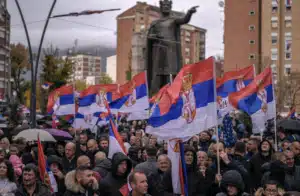
Demonstrations by Serb Kosovars in northern Kosovo, Nov. 5, 2022 (credits: Armend Nimani/Afp)
The situation worsened when Lista Sprska took over the reins of popular protest in northern Kosovo. On November 5, mass resignations of Serb representatives of national institutions were staged in protest against the phased plan for implementing license plate replacement rules: in Kosovska Mitrovica, Zubin Potok, Zvecan, and Leposavić it became necessary to return to the polls due to the resignation of the four mayors. At the same time, a compromise solution on license plates was reached on the night of November 23-24 in Brussels, even though the Serbian president threatened to boycott the EU-Western Balkans summit in Tirana because of the appointment of Nenad Rašić (instead of Lista Srpska leader Goran Rakić) in the Kosovo government as minister for communities and refugee return. Rašić is the leader of the Democratic Progressive Party, a Serbian formation hostile to Belgrade.
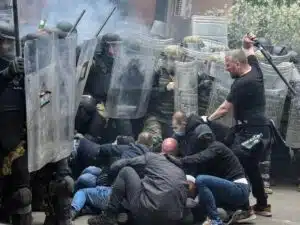
Clashes between Kosovo Serb protesters and NATO Kfor mission soldiers in Zvečan, May 29, 2023 (credits: Stringer/Afp)
The year 2022 ended with a new escalation of tension at border crossings in northern Kosovo after Pristina decided to send a few hundred police to replace the officers who had resigned in November. It only took five months for the new crisis, until May 26, 2023. Due to the swearing-in of the newly elected mayors of Zubin Potok, Zvečan, Leposavić, and Kosovska Mitrovica, fierce protests broke out, turning on May 29 into a guerrilla warfare that also involved soldiers from the international Kfor mission led by NATO. Tensions erupted over the Kurti government’s decision to bring special police forces to allow mayors elected on April 23 into town halls, in a controversial election round due to very low voter turnout.
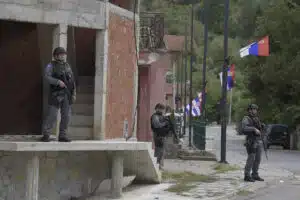
(credits: Armen Nimani / Afp)
Meanwhile, an arrest/kidnapping of three Kosovar policemen by Serbian security services was staged on June 14, for which the governments of Pristina and Belgrade accused each other of trespassing by their respective law enforcement agencies. Brussels convened an emergency meeting with PM Kurti and President Vučić to get out of “crisis management mode,” and it was not until June 22 that the three Kosovar policemen were released. But because Pristina failed to take a “constructive attitude” to de-escalate the tension, Brussels imposed “temporary and reversible” measures against Kosovo in late June (still in place, despite the roadmap agreed on July 12). However, the situation escalated with the terrorist attack on September 24 near the Serbian Orthodox monastery in Banjska. On the day of clashes between the Kosovo police and a group of about 30 gunmen, a policeman and three attackers were killed.
Developments in the attack showed clear branches in neighbouring Serbia. Between the bombers outside the monastery was also Milan Radoičić, deputy head of Lista Srpska (as confirmed by himself a few days after the armed attack) as well as Milorad Jevtić, a close associate of the Serbian president’s son, Danilo Vučić. To make matters worse, a Serbian “major military deployment” along the administrative border was reported by the United States. The threat has not materialized, but the EU has begun to reflect on the ability to impose the same measures in force against Pristina against Belgrade as well. But the green light needed unanimity in the council and Vučić’s closest ally inside the Union, the Hungarian premier, Viktor Orbán, vetoed it.
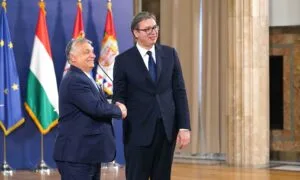
From left: the prime minister of Hungary, Viktor Orbán, and the president of Serbia, Aleksandar Vučić, in Belgrade (July 8, 2021)
The only positive news at the moment is the resolution of the “battle of the license plates” between Serbia and Kosovo, thanks to the decision that came between late 2023 and early 2024 on mutual recognition for vehicles entering the border, even given the unpromising assumptions on which the new year is being set. With the enactment of the Regulation on transparency and stability of financial flows and combating money laundering and counterfeiting, as of February 1, the euro became the sole currency of exchange and deposit in bank accounts. The Serbian dinar can still be traded like the Albanian lek or the dollar, but the decision will impact all those public services that never adapted to Pristina’s adoption of the euro in 2002 (even before independence). Serbian President Vučić has warned that he will use “all available means against the ban on the dinar in Kosovo” (although this is a non-factual interpretation of reality), engaging the chairwoman of the EU Commission, Ursula von der Leyen: “I asked that she use all her strength and energy to make sure that such a thing does not happen.”
Find more insights on the Balkan region in the newsletter BarBalcani hosted by Eunews
English version by the Translation Service of Withub






